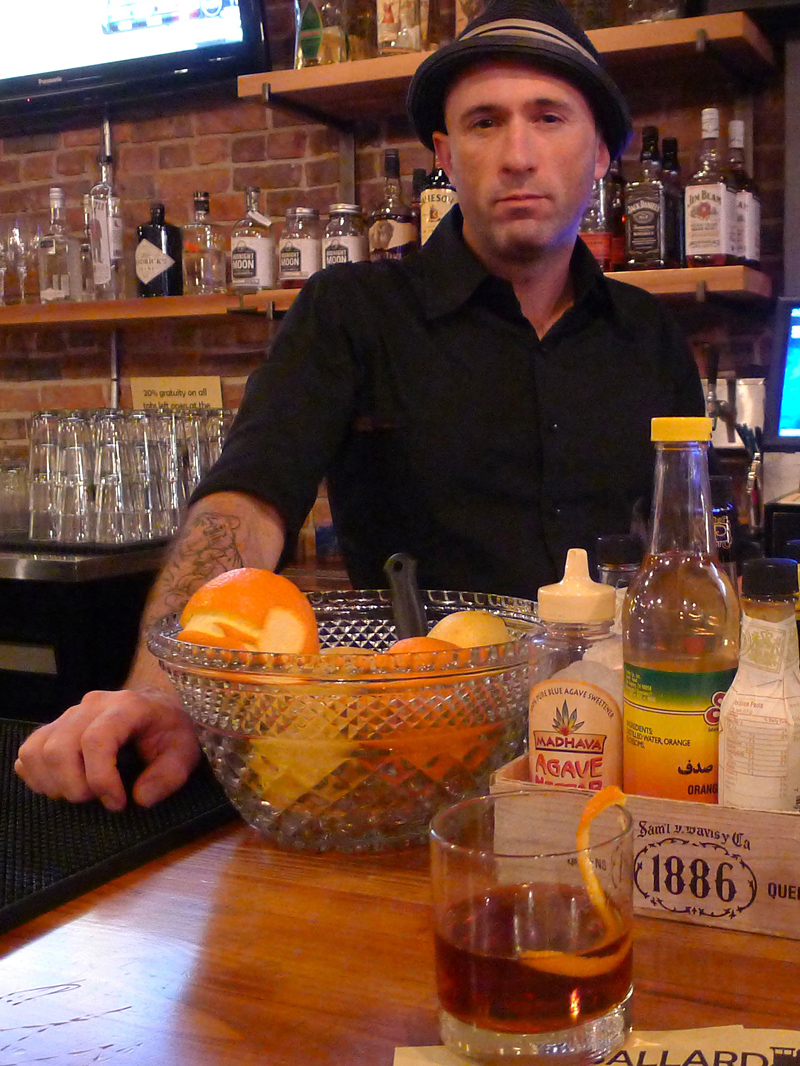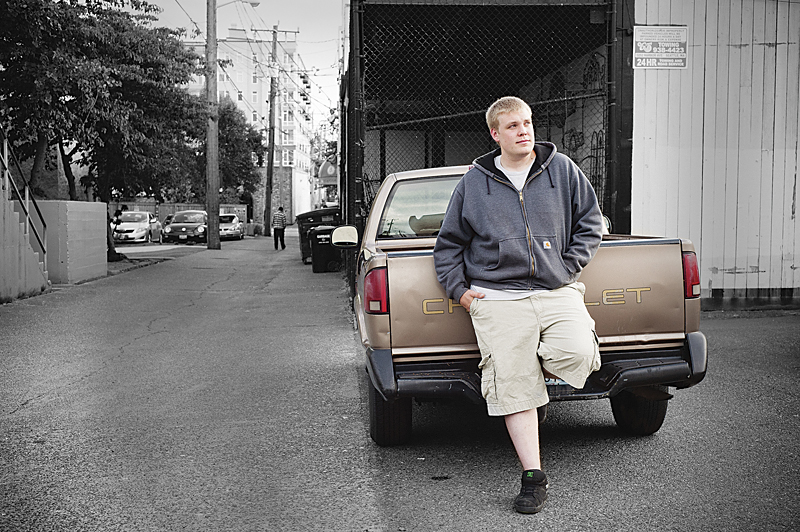Though it was years in the making, Kasey Anderson’s life ultimately imploded in about 72 hours. In late October of this year, the singer and his band, the Honkies, had just returned here from a West Coast tour following a stint in Europe opening for Counting Crows. Home in Seattle, friends traded tales of Anderson’s bizarre, reckless, and baffling behavior. And when they compared his various explanations and excuses, what they found was troubling. As Anderson himself puts it, “They unearthed one thing after another.”
After swearing off alcohol several years earlier, Anderson had fallen hard off the wagon and was drinking heavily. He confesses to being “dishonest” about money owed his bandmates, and says his ex-girlfriend discovered he had been unfaithful “to a very sick degree.” Most incredible, however, it came to light that he was embroiled in a $250,000 federal lawsuit.
Anderson stood accused of swindling a group of investors by peddling a nonexistent benefit album for the West Memphis Three, young men widely believed to have been wrongfully imprisoned for murders they did not commit. The alleged scheme included forging the signature of Bruce Springsteen’s manager and telling a whopper of a lie: The Boss would perform with Lady Gaga and Arcade Fire on the phony charity record.
Thin with a scruffy beard, the 33-year-old Anderson wears a flat gray cap and a black leather jacket beneath a gray hoodie during a recent interview at a downtown Seattle bar. He takes a sip of water, pausing to consider the manner in which his various lies were exposed, and how his once-promising music career came to a grinding halt. “I didn’t ever confront the enormity of what I’d done to people until after everybody already knew,” Anderson says. “Everybody just sort of closed in on me. Not in a malicious way, but because they were worried about me. It’s not the behavior of a healthy person.”
To hear Anderson tell it, the West Memphis Three record began as an earnest attempt to raise money for a worthy cause. His close friend Danny Bland was executive producer of Free the West Memphis 3, an album released in 2000 to benefit the trio’s legal defense fund, which featured tracks by Eddie Vedder, Joe Strummer, and the Murder City Devils, among others.
Bland says Anderson approached him with an idea for a new West Memphis Three project, but he told his friend the timing was wrong. After nearly two decades of appeals, the Three were on the verge of freedom, which eventually came on August 19, 2011. (See Erin Thompson’s “Way West of Memphis,” SW, March 21, 2012.)
“I thought that was pretty much the end of it,” Bland says. “When I found out what happened later, it was a shock. I could not believe it. It’s just such an unbelievable scenario. It sounds like a crime novel or something.”
Aside from the ill-timed benefit record, Anderson’s career was on the upswing. Singing with a gravelly twang that sounds more like he hails from northeast Texas than his native southwest Washington, Anderson capably wields an electric guitar and follows in the footsteps of countrified barroom rockers like Steve Earle. Critics praised his 2010 record Nowhere Nights, and he found fans in the Pacific Northwest and abroad. He formed his own label, Red River Records, and seemed destined for bigger things.
“He sold pretty well, especially regionally in Seattle and Portland,” says Bill McNally, vice-president* of Burnside Distribution Corporation, distributor of several Anderson releases. “He’s very professional, he’s got a good voice, his songwriting is decent, he’s got a really good backing band he’s working with—they were pretty successful there for a while.”
But behind the scenes, Anderson was often out of control. He struggled with substance abuse and amassed considerable debt. Investors from California, Arizona, and New York bankrolled his 2009 European tour, and that year he convinced the group to lend him $103,000, purportedly for the West Memphis Three record, supposedly to feature cuts from R.E.M., Willie Nelson, and Tom Waits in addition to Springsteen. Though it must have been obvious that the benefit album would never be recorded, Anderson claims he never made a conscious decision to divert the funds for his own gain. “Once the money was raised and kept being raised for other projects, that’s the part that I can’t wrap my head around,” Anderson says. “Why didn’t I just say ‘This is not going to happen, here’s everything back’?”
Naturally, when the Three were set free, the businessmen started asking for refunds. Anderson allegedly concocted various “falsehoods and elaborate explanations” to dodge his debt, including claims that his checks were stolen in the mail and that he was the victim of identity theft. In reality, it was Anderson who was guilty of stealing an identity: To further sell the idea to his investors, he created an e-mail account and sent messages passing himself off as his friend Danny Bland.
“It was basically me representing myself as an expert in the case and the music industry,” Bland says of the way Anderson exploited his reputation in the fraudulent e-mails. “That could be considered true, but it wasn’t actually me writing that.”
Anderson managed to keep the lawsuit mostly under wraps until the case officially closed on October 17 with a $185,000 judgment levied against him. Soon after, financial issues and Anderson’s increasingly erratic behavior led the Honkies to split up. (Ex-Honkies member Andrew McKeag did not respond to interview requests for this story; singer Star Anna, who accompanied Anderson on his recent West Coast tour, also declined to comment through a spokesman.) Sensing deeper problems beyond the fraud accusations, Bland and others urged Anderson to seek help.
Despite the flagrant breach of trust in their friendship, Bland holds no grudge against Anderson, and says simply, “In general, it’s a sad thing that happened and I want him to get help.”
Anderson says he underwent a medical evaluation in early November, and was ultimately diagnosed as Type I bipolar—an acute form of the disorder that, according to the Mayo Clinic’s definition, is characterized by severe mania, risky behavior, delusions, and “spending sprees or unwise financial choices.”
The bouts of mania fueled endless hours of songwriting and jamming, Anderson says, but also left him feeling “like a werewolf.” “You’re out of control for short or prolonged bursts, and the rest of your life is trying to hide that from people,” the singer explains. “It’s episodic in such a way where there’s a month or a couple months where I’m very much out of control, and the rest of my life is spent doing damage control and trying to hide what I’ve done.”
In early November, two weeks after the three days that left his life in shambles, Anderson seems genuinely contrite. He is emotional, but not in the morose depths of the downer stage of his manic-depressive roller coaster. Now taking a daily dose of lithium (Anderson brought to our meeting his pills, the prescription, and what appears to be a second note from his doctor), he has since enrolled in an intensive outpatient treatment program and plans to continue counseling.
Though the lawsuit makes it seem as if he’d been intent on fleecing his investors from the outset, Anderson claims his intentions were good, and things simply got out of hand. “To the outside it looks like this guy is just malicious and just bleeds people dry,” he says. “I didn’t set out to do this. I abhor the person that I was, and the person that I am. I don’t want to be this person. I don’t want to be a person who is capable of those things, and when I think about it, don’t know how I could be. I’m not that person in my heart.”
Anderson continues to deny some of the lawsuit’s allegations—he did not, he claims, forge Springsteen’s manager’s signature—but he admits to much of the deception, including impersonating Bland and dreaming up the star-studded list of performers he pitched to investors. He says he spent most of the misappropriated money repaying loans to his parents, and vows to make good on his remaining debts to his business partners and former bandmates. When or how he will settle up remains unclear. His music career is on indefinite hiatus, and the court-ordered judgment allows 20 years for repayment.
“My clients have not been paid back a dime,” says Anna Sortun, the attorney representing Anderson’s cadre of investors. “They feel like they were completely victimized, and just nothing happened.”
Although he has stopped performing for the time being, Anderson says he is taking refuge in music. He recently shared several new acoustic demos on his Tumblr page, songs with titles like “Up in Smoke” and “Still Breathing.” A few days after starting his lithium regimen, Anderson was hopeful for his future, but also nervous about adjusting to life without the heartbreak and benders that inspired so many of his songs.
“It’s always great to eliminate the really reckless and destructive behavior, but it will be interesting to adjust to losing the creativity that came along with it,” Anderson says. “But if I never write another song again, if I never hurt anybody again, that’s a fair trade to me. It’s not worth 15 good songs to ruin all your friendships and your relationship.”
*CORRECTION: This quote from Burnside Distribution vice-president Bill McNally was originally wrongly attributed to operations manager Frank Brandon.







